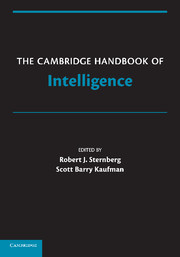Crossref Citations
This Book has been
cited by the following publications. This list is generated based on data provided by Crossref.
Sternberg, Robert J.
2012.
Handbook of Psychology, Second Edition.
Machackova, Vendula
2012.
Perception of Creativity in International Franchising Business Concepts - Comparison Analysis Between Franchisees and Franchisors.
Creative and Knowledge Society,
Vol. 2,
Issue. 1,
p.
60.
Smith, L. Mazzoli
and
Campbell, R. J.
2012.
The Recognition of Cultural Bias in Researching Those Labelled Gifted: An Overdue Perspective.
Gifted and Talented International,
Vol. 27,
Issue. 1,
p.
55.
Sternberg, Robert J.
2012.
Intelligence.
Dialogues in Clinical Neuroscience,
Vol. 14,
Issue. 1,
p.
19.
Campbell, R. J.
and
Smith, L. Mazzoli
2012.
De-Mystifying Giftedness: An Overdue Perspective.
Gifted and Talented International,
Vol. 27,
Issue. 2,
p.
27.
Sternberg, Robert J.
2012.
Intelligence.
WIREs Cognitive Science,
Vol. 3,
Issue. 5,
p.
501.
Sternberg, Robert J.
2013.
“The Intelligence of Nations”.
Perspectives on Psychological Science,
Vol. 8,
Issue. 2,
p.
187.
Mears, Daniel P.
and
Cochran, Joshua C.
2013.
What is the effect of IQ on offending?.
Criminal Justice and Behavior,
Vol. 40,
Issue. 11,
p.
1280.
Hunt, Earl
and
Jaeggi, Susanne
2013.
Challenges for Research on Intelligence.
Journal of Intelligence,
Vol. 1,
Issue. 1,
p.
36.
Wadsworth, Sally J.
Corley, Robin P.
and
DeFries, John C.
2014.
Behavior Genetics of Cognition Across the Lifespan.
p.
3.
Péter-Szarka, Szilvia
2014.
Talent identification in Hungary: From identification to investigation.
Psihološka obzorja / Horizons of Psychology,
Vol. 23,
Issue. ,
p.
155.
Furnham, Adrian
and
Wu, Chun
2014.
The little emperor: Chinese parents’ assessment of their own, their partner’s and their only child’s intelligence.
High Ability Studies,
Vol. 25,
Issue. 2,
p.
121.
Mintz, Laura Janine
and
Stoller, James K.
2014.
A Systematic Review of Physician Leadership and Emotional Intelligence.
Journal of Graduate Medical Education,
Vol. 6,
Issue. 1,
p.
21.
2014.
Perceptions of Knowledge Visualization.
p.
131.
2014.
Computational Solutions for Knowledge, Art, and Entertainment.
p.
330.
Makel, Matthew C.
Snyder, Kate E.
Thomas, Chandler
Malone, Patrick S.
and
Putallaz, Martha
2015.
Gifted Students’ Implicit Beliefs About Intelligence and Giftedness.
Gifted Child Quarterly,
Vol. 59,
Issue. 4,
p.
203.
Ursyn, Anna
2015.
Handbook of Research on Maximizing Cognitive Learning through Knowledge Visualization.
p.
1.
Hughes, Sean
and
Barnes‐Holmes, Dermot
2015.
The Wiley Handbook of Contextual Behavioral Science.
p.
179.
Saffari, Mohsen
Karimi, Tooba
Koenig, Harold G.
and
Al‐Zaben, Faten
2015.
Psychometric evaluation of the Persian version of the Type 2 Diabetes and Health Promotion Scale (T2DHPS): a diabetes‐specific measure of lifestyle.
Scandinavian Journal of Caring Sciences,
Vol. 29,
Issue. 3,
p.
603.
Nakamura, Daisuke
2015.
Exploring Implicit Cognition.
p.
61.





